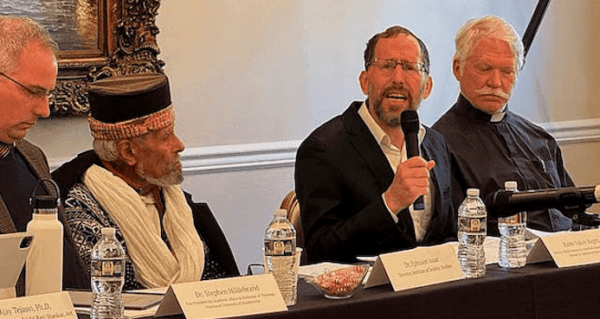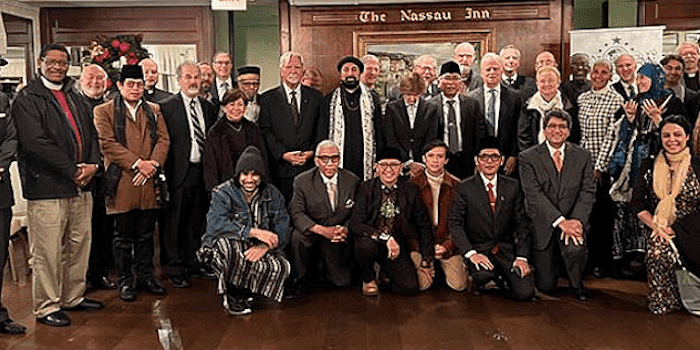|
إستماع
Getting your Trinity Audio player ready...
|
Last month marked the 75th anniversary of the historical Universal Declaration of Human Rights. This document was drafted in part in response to the atrocities committed by Nazi Germany. For the Jewish people, the barbaric massacre by Hamas on October 7th was our darkest day since the Holocaust, a painful illustration of the lack of fulfillment of the lofty vision of that document. The atrocities of the Hamas are but one of many contexts in which religious, ethnic or national identities have been weaponized to become sources of violence. In acknowledgment of this painful reality, the world’s largest Muslim organization, the Nahdlatul Ulama based in Indonesia, has been leading global initiatives “to ensure that our religious traditions serve as a genuine and dynamic source of solutions, rather than problems, in the 21st century”.
One of their long-term initiatives is building a global consensus of the world’s religious leaders for a parallel, religion-based Universal Declaration of Human Rights. On 13 – 14 December 2023, representatives of the world’s major faith traditions gathered in Princeton to discuss the future of the Universal Declaration of Human Rights. Princeton University’s James Madison Program for American Ideals and Institutions hosted the conference, which was co-sponsored by the Nahdlatul Ulama, the Center for Shared Civilizational Values (CSCV), the R20, and the global Humanitarian Islam movement. I was privileged to attend the event and, in my address, present a vision for the future and a path for us to follow to achieve it:
Religion must Return to the Fundamentals

The hope for religion to be a force for peace is a vision that has guided my work for years. The hope that in the world’s conflicts, in particular the Israeli-Palestinian conflict, religion moves from being part of the problem to part of the solution. That our innermost identities not pit us against one another but rather bring us together to build a noble future and share in a great unfolding story, in which there is a place for all: Jews, Muslims and Christians, Israelis and Palestinians.
Without acknowledging how deeply this vision has been challenged by October 7th and its aftermath, which has led to so much suffering, we cannot authentically present what could be a path forward. For me, the trauma and pain of the current war are personal as among the dead are students, family, friends and children of friends. Three of my sons have been called up to serve in the IDF. The current war creates a triple crisis of faith. It challenges faith in the goodness of humanity, in a benevolent God who guides the world, in the power of religion to bring peace.
John Lennon’s iconic song “Imagine” challenged religion by identifying it as an impediment for people to live together in peace. In meeting this challenge, we shouldn’t settle merely for religion to cease to fuel conflicts, rather we must aspire to harness it to fulfill the ideals shared by major world religions: a shared and sacred humanity and responsibilities for the wellbeing of the other. These teachings if fulfilled can bring blessing and healing to our broken world.
Why is it that we are so far from this vision? Religions are powerful because for their adherents they represent ultimate meaning, truth and value. But just as power can be used to build, power can be used to destroy. This duality must be acknowledged and understood by each tradition if we seek for our religions to make the world more like heaven and less like hell.
The Talmud warned against the danger of those who make the Bible into what it calls “a potion of death” instead of “a potion of life”(Yoma 72). The poet William Blake roots this danger in the way sources are interpreted: “Both read the Bible day and night, but you read black where I read white”.
If so, does this mean that all is subjective and religion’s holy script has no clear messages or truths? NO! Religions have fundamentals, religions have core values. In each religion, there is that which is the guiding rule and that which is the exception, exceptions which need to be understood often by noting their particular context.
The great tragedy is when in order to vent angry grievances or to promote an egoist search for power, the exceptions are made into the rules and perverse interpretations evolve. Rabbi Jonathan Sacks decried the use of the term “fundamentalists” to describe violent extremists as it assumes that the fundamentals of religion are dangerous. On the contrary. religions become dangerous when we forget their fundamentals and the so-called fundamentalists are those who most violate them.
This pathology must be overcome. Many of the current responses are insufficient:
Cherry-picking sweet and sugary sources while ignoring the problematic ones won’t make them go away.
Aspiring to reform religion is self-defeating as it concedes to the extremists that their interpretation of an unreformed religion is indeed correct.
Rejection of parts of holy script and tenets won’t be accepted by religious adherents who see these as sacred.
What can be done? Marcel Proust defined the challenge of life not as discovering new lands but in seeing the old ones with new eyes. So too the challenge for religion to become a source of connection and reconciliation between conflicted people with different religious identities. It is not about replacing our respective sacred books but in rereading them with new eyes and interpreting them in accordance with the will of God who all Abrahamic religions agree is a personal God of compassion and mercy with a concern and love for all humanity. This process is not about rejecting but rather returning to religion’s fundamental beliefs and contextualizing sources that seem to contradict them.
This entails building deeply authentic and source-based theological and spiritual paradigms that grant legitimacy and value to the other’s religious identity. To acknowledge that the other loves and is beloved by God and is our partner in serving the divine.
A moving example of this process is what the Catholic Church achieved with Nostra aetate which has led to profound changes in Christian-Jewish relations. A necessary next step is a bilateral Nostra aetate between Judaism and Islam a long-term project of our institution, the Ohr Torah Beit Midrash for Judaism and Humanity. Relationships demand to truly understand and appreciate one another. To achieve this, both sides must study deeply not only their own sources but those of the other. They must also truly encounter the existential reality and religiosity of the other. Personal relationships, joint study and prayer can be transformative in opening the heart and consciousness to the other and their identity. New theological paradigms must be massively disseminated throughout our respective communities by education and by grass roots encounters if there is to be lasting change.
A moving paradigm shift is symbolized by the name of the peace agreements between Israel and some of its neighboring Arab Muslim nations. The “Abrahamic Accord” expresses the shared religious and ethnic heritage uniting Jews and Muslims. If identity can be a wedge dividing Jews and Muslims, here it is was channeled to create a narrative of connection.
An application of this paradigm is central to the book my Beit Midrash recently completed about minority rights in Israel according to Jewish Law.
A central theme of the book is that whereas the biblical category for minorities, “Ger Toshav,” is about benevolent tolerance, the contemporary reality of minorities in Israel, who share with the Jewish people both a religious and ethnic Abrahamic identify, should lead to a partnership in which we are blessed by the presence of the other.
I know this vision seems distant from the painful reality of the war. In these dark times, the Bedouin of Israel’s south are one source from which I draw hope. They number more than 300,000, and for years they have inspired me by how they balance multiple identities. Israeli by citizenship, Muslim by religion, Arab by ethnicity and, with their proximity to Gaza, many were born or have close family there. The pain and horror of the massacre has deepened their connection with their fellow citizens. Recently I spent a day in Rahat, Israel’s largest Muslim city, with a large group of imams and rabbis preparing food packages for refugees, studying Jewish and Islamic sources about the sanctity of life and finally praying together, the Jews facing Jerusalem, the Muslims Mecca – but our hearts united.
*
Related Articles
Jean-Miguel Garrigues, théologien : « Une doctrine de l’Eglise primitive a généré des siècles de souffrances pour les juifs dans le monde chrétien »
اللاهوتي جان ميغيل غاريغ: “عقائد الكنيسة الأولى ولّدت قرونًا من المعاناة لليهود في العالم المسيحي”

